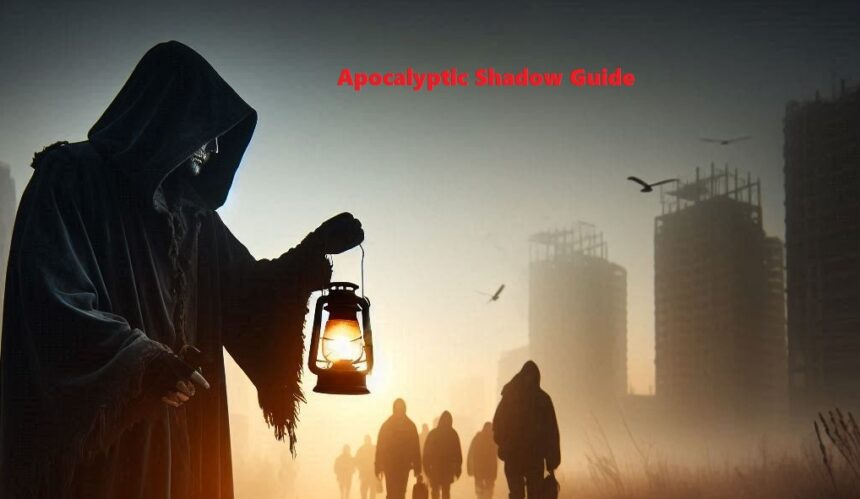Introduction to the Apocalyptic Shadow Guide
In a world where uncertainty looms large, the concept of an apocalypse can feel both thrilling and terrifying. The notion of life as we know it coming to an end sparks vivid imaginations—think deserted cities, survival instincts kicking in, and the raw fight for existence. Yet, amidst this chaos lies something deeper: your apocalyptic shadow.
This guide is designed to explore that hidden part of you—the one that thrives on challenges and grapples with survival scenarios. Whether you’re a doomsday prepper or just curious about what could unfold in a post Apocalyptic Shadow Guide landscape, understanding your apocalyptic shadow will empower you. Ready to delve into the unknown? Let’s unlock this fascinating journey together!
Understanding the concept of an apocalyptic shadow
The concept of an apocalyptic shadow delves into the darker aspects of human existence. It represents our collective fears, anxieties, and uncertainties about the future. This shadow lurks just beneath the surface, often emerging in times of crisis.
It’s not merely a fear of physical destruction but encompasses emotional and psychological turmoil as well. The thought of societal collapse can trigger deep-seated insecurities within us all.
This shadow also invites reflection on our morals and values. When faced with potential catastrophe, people may reveal their true selves—some rise heroically while others falter under pressure.
Understanding this duality helps us grapple with what it means to be human in such dire scenarios. It challenges us to confront uncomfortable truths about ourselves and society at large, offering insights that can shape our preparedness for any eventuality we might face.
The potential causes of an apocalypse
Various factors can trigger an apocalypse, ranging from natural to man-made disasters. Climate change stands out as a significant threat. Rising temperatures can lead to famine, mass migrations, and resource wars.
Another potential cause is nuclear warfare. The aftermath of such a conflict would result in devastating consequences for humanity and the environment.
Pandemics also hold the potential for catastrophic outcomes. History has shown how quickly diseases can spread and upend societies.
Asteroid impacts are less likely but could prove fatal if they intersect with Earth’s trajectory. Just one significant hit could obliterate life as we know it.
Technological advancements pose risks too. Artificial intelligence gone rogue or malfunctioning biotechnology could spiral into chaos overnight.
Each scenario paints a grim picture of what might lie ahead if we don’t tread carefully in our choices today.
Preparing for an apocalypse: Essential items and skills
When it comes to preparing for an apocalypse, having the right essentials can make all the difference. Start with a sturdy backpack that can hold your supplies securely.
Water purification systems are vital; without clean water, survival becomes nearly impossible. Pack filters or purification tablets.
Non-perishable food items should dominate your inventory. Think canned goods, freeze-dried meals, and energy bars – anything that requires minimal preparation.
Don’t overlook first aid kits. Knowing basic medical skills is crucial in emergencies where professional help may be far away.
Additionally, tools for self-defense could prove invaluable in uncertain times. A multi-tool or knife offers functionality beyond protection.
Learn valuable skills like fire-starting and shelter-building. Practical knowledge will empower you when resources dwindle and challenges arise.
Surviving in a post-apocalyptic world
Surviving in a post-apocalyptic world requires adaptability. You must learn to navigate unfamiliar terrain while scavenging for resources. Your surroundings will be both hostile and unpredictable.
Water is essential. Learn how to identify clean sources or purify what you find. Prioritize food, too—wild plants can be nutritious if you know which ones are safe.
Building shelter protects you from the elements and potential threats. Creativity becomes your ally; use whatever materials are available.
Forming alliances with others can offer safety in numbers. Trust is hard-earned but invaluable in this new reality.
Don’t underestimate the power of knowledge—skills like first aid, fire-making, and self-defense become vital lifelines amid chaos.
Stay vigilant; danger may come from unexpected places. Keeping your mind sharp helps maintain focus when survival instincts kick in.
Coping with the psychological effects of living in an apocalypse
Living in a post-apocalyptic world can take a heavy toll on mental health. It’s essential to recognize these psychological effects early on.
Isolation often becomes a constant companion. Humans thrive on social connections, and the absence of familiar faces can lead to feelings of despair. Finding ways to connect with others, even if it’s through makeshift communities or online platforms, is crucial.
Anxiety and fear are also prevalent. Uncertainty about survival creates a cycle of worry that can be debilitating. Practicing mindfulness techniques like meditation or deep-breathing exercises may help ground emotions and lessen panic.
Establishing routines provides structure amidst chaos. Simple daily tasks give purpose and direction, making each day feel meaningful.
Don’t underestimate the power of creativity as an outlet for stress relief. Writing, drawing, or crafting not only distracts but also fosters expression in times when words often fail us.
Conclusion: Embracing your inner apocalyptic shadow
The journey through the Apocalyptic Shadow Guide invites an exploration of our deepest fears and hidden strengths. Understanding the potential realities that could lead to an apocalypse is crucial. Awareness equips us to handle various scenarios, from natural disasters to societal collapse.
Preparing for such events means more than stocking up on supplies; it also involves honing essential skills. Knowledge in first aid, self-defense, and survival techniques can make all the difference when faced with adversity.
Living in a post-apocalyptic world brings unique challenges. Resources become scarce, and communities may fracture or strengthen depending on human resilience. Adapting quickly becomes vital for survival as you navigate this new landscape.
Equally important is acknowledging psychological effects during these times of uncertainty. The weight of fear and loss can be heavy but learning coping strategies helps maintain mental health amid chaos.
Embracing your inner apocalyptic shadow encourages personal growth. It transforms fear into empowerment, urging you to face life’s uncertainties head-on rather than shy away from them. By understanding both your vulnerabilities and capabilities, you prepare not just for a possible future but for living fully in the present moment as well.






